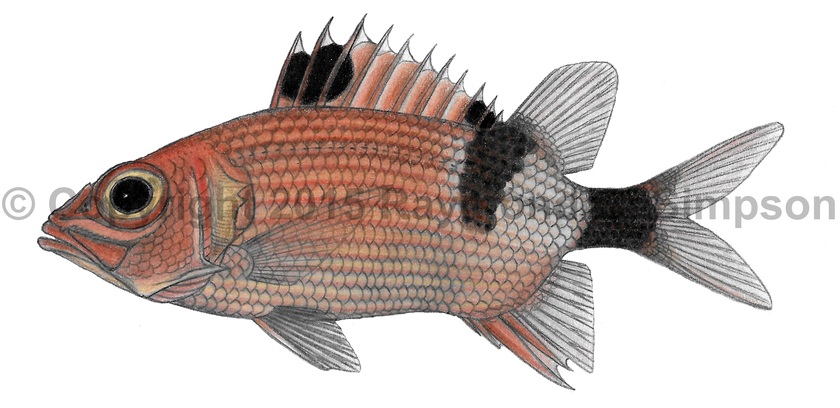
Common Name
Saddle Squirrelfish
Year Described
Woods, 1965
Identification
Dorsal Fin: XI, 13
Anal Fin: IV, 8-9
Pectoral Fin: 13-14
Lateral Line Scales: 37-40
Vertebrae: 27 (total)
Gill Rakers: 18-20
Body oval with a flattened ventrum and convex dorsal profile. Head with small serrations on suborbital but no strong spines. Snout blunt with a convex frontal profile. Nasal bone with spines. Eye very large. Preopercle with a strong spine at the angle. Opercle with 2 strong spines and additional serrations on margin. Mouth fairly small; reaching middle of orbit. Dorsal fins separate with strong notch. Rear dorsal and anal fins pointed. Caudal fin with rounded lobes and relatively small. Last dorsal spine shorter than second to last spine. Third anal spine strong. Scales obvious and rough.
Color
Body and head bright red, with faint parallel pale lines following scale rows ventrally and darker stripes dorsally. A black blotch between dorsal spines 1-4 and another blotch between spines 8-10. A faint to obvious saddle blotch is present on the body under the soft dorsal fin, often with a pale whitish area posterior to the saddle. The caudal peduncle is largely black. The fins are pale reddish.
Size
Maximum size to 13cm SL.
Habitat
Inhabits coral reefs and deep reefs from 2-152m.
Range
Scattered records from the Gulf of Mexico and the Caribbean Sea, including Curacao, the Bahamas, and the Flower Garden Reef system.
References
McEachran, J.D. and J.D. Fechhelm. 1998. Fishes of the Gulf of Mexico. Volume 1: Myxiniformes to Gasterosteiformes. University of Texas Press, Austin. i-viii + 1-1112.
Other Notes
Studies have suggested either this genus or Neoniphon for this species. This species is poorly known and large, plain adults may be responsible for records of S. hastatum in the Caribbean.